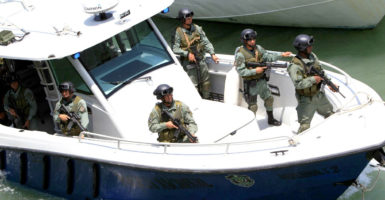According to the newly released Trafficking in Persons (TIP) report, the number of human trafficking victims rescued and traffickers prosecuted nearly doubled in 2016. The statistics offer hope that greater emphasis is being placed on rule of law solutions to fight human trafficking.
The report, conducted by the Office to Monitor and Combat Trafficking in Persons at the U.S. Department of State, found that nearly 78,000 victims were identified in 2016, a notable increase from 2015 when just under 45,000 victims were identified.
Nonetheless, if you accept current estimates on the number of trafficking victims worldwide (The Walk Free Foundation estimates nearly 45 million in their Global Slavery Index), the number of victims rescued in 2016 is less than .2 percent.
Even if you adopt more conservative estimates on the number of human trafficking victims worldwide, the International Labor Organization estimates 21 million, less than .4 percent of victims were identified in 2016. While these improvements are laudable, they must be viewed in the context of millions of unreached human trafficking victims worldwide.
In addition to evaluating Global Law Enforcement data, the TIP report ranks countries according to their compliance with minimum standards for combatting trafficking in persons from best to worst in four categories: Tier 1, Tier 2, Tier 2 Watch List, and Tier 3.
The TIP report’s findings grant credence to the longstanding argument for promoting economic freedom, or rule of law solutions, to combat human trafficking. A recent Heritage report which compared country’s tier rankings in the TIP report with their economic freedom scores in The Heritage Foundation’s 2016 “Index of Economic Freedom” noted, “[a] close examination of human trafficking and the principles of economic freedom—especially strong rule of law—reveals the robust connections between these two desirable societal outcomes.”
The TIP report’s findings demonstrate that international anti-trafficking efforts are having an impact, but also serves as a reminder to remain vigilant in instituting rule of law solutions to fight against modern-day slavery.
Part of improving rule of law requires better data to evaluate the scope of human trafficking and to serve as a benchmark for assessing anti-trafficking efforts.
The report itself highlighted this need stating:
Reliable baseline information, data, and research that illuminates the causes, prevalence, characteristics, trends, and consequences of all forms of human trafficking in various countries and cultures is crucial for developing anti-trafficking prevention strategies and measuring their impact… Accurate baseline data is critical not only in the development of prevention measures but also for accurate assessment of the impact of policies and assistance programs, including unintended negative consequences.
Notable changes in 2016 tier rankings include Thailand upgrade from Tier 3 to Tier 2 Watch List, and Burma’s downgrade to Tier 3 due to an uptick in trafficking during the Southeast Asian migrant crisis in Spring 2015 and ongoing abuse of persecuted Muslim minorities, the Rohingya.
No doubt anti-trafficking efforts have come a long way –the State Department’s seminal anti-trafficking report has played a key role in raising awareness and spurring efforts globally.
However, much more can and must be done to eliminate human trafficking. Rule of law solutions and improving data to evaluate this global scourge must be chief among the solutions.






















